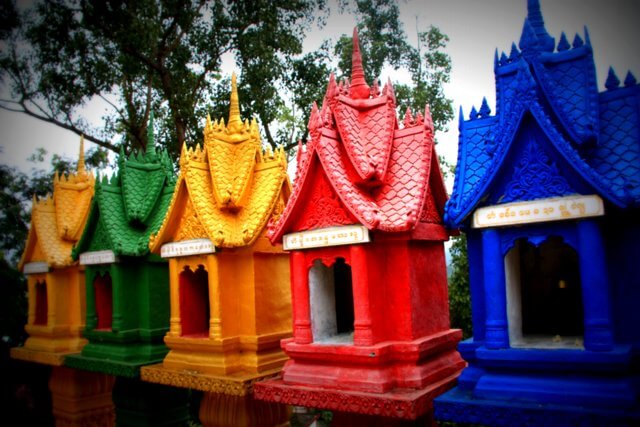
Arriving in Xishuangbanna from Lijiang, the first big difference is the heat. We’d left Lijiang Old Town in the early hours of the morning, dressed in thermals, coats and hats. Just a one-hour flight later the plane deposited us 700km south and 2000m lower, in the tropical humidity of Jinghong City.
Xishuangbanna is home to the Dai people, and is a translation of their name for the place, Sibsongbanna meaning “Twelve-thousand rice fields”.
Xishuangbanna borders Burma and Laos, and is bisected by the Luosuo River which starts in Tibet, flows through Yunnan and enters Laos where it joins the Mekong.
Minority Village tour
XSBN has a number of showcase villages, designed for domestic tour coaches. Actors pretend to do traditional Dai villager things so that tourists can get their photos and drive off.
Instead, we opted for a cab ride to a random point on the map, but the Dai taxi driver realised what we were doing and instead took us to his home village.
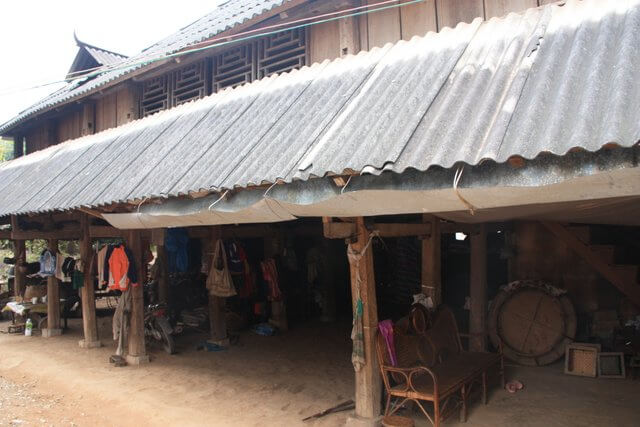
XiShuangBanna Dai Village House
Dai Village
The Dai village was a simple place of wooden huts and roaming chickens – a huge contrast from the glass and concrete skyscrapers we’ve become so used to in Beijing.
Instead of fake Versace and Burberry, many people still wore traditional home-made clothes. We were spotted by a farmer who invited us into his spotless home where his daughter sat weaving at a dilapidated loom.
This was as much for them to study us as for us to meet them. Assuming I didn’t know any Chinese, they happily discussed me:
From the old farmer, whose pointy hat peaked far short of my shoulder: “He’s very tall isn’t he?”
“And very broad.” his daughter added, grinning.
“And quite wide” came an unseen female voice through the floorboards from upstairs. Coward.
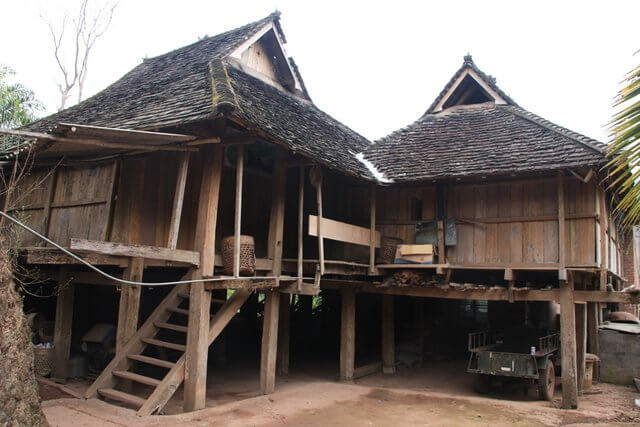
XiShuangBanna Aini Village House
Aini Village
Further down the road was an Aini village. The Aini are a subset of the already tiny Hani minority. The buildings here were still wooden, but better made than the Hui village. Most noticeably, there was far less civic pride – the free roaming chickens pecked their way through numerous piles of rubbish and discarded food waste.
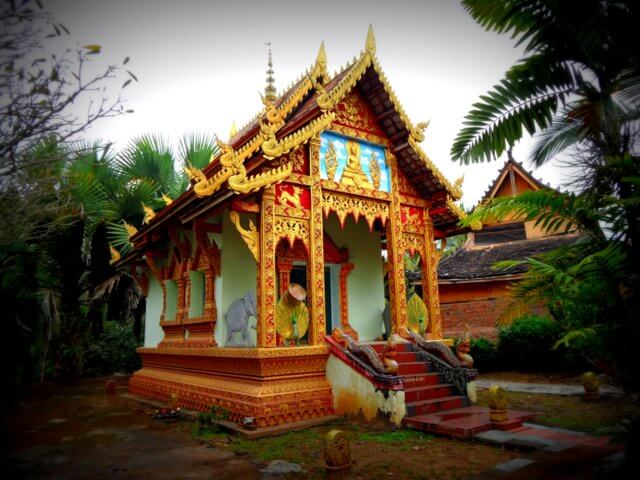
This larger, richer village had constructed an ornate temple on a hill overlooking the town. Walking up to the temple hill, the first thought is that it’s all rather messy. Everything from old candles, to broken crockery and car parts lay strewn over the hillside.
The temple was a square gold stupa, backed by two smaller temples and a reasonably modern concrete house for the monks.
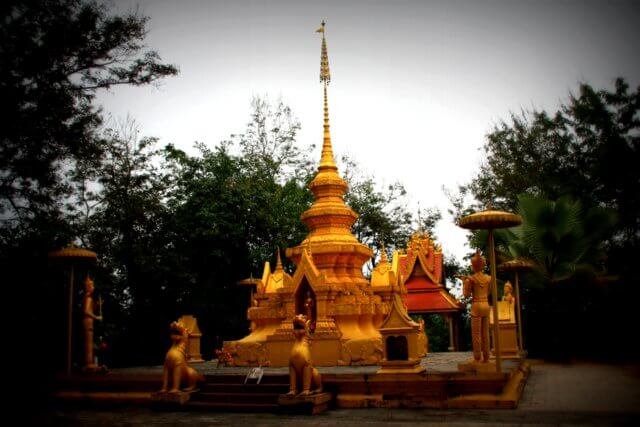
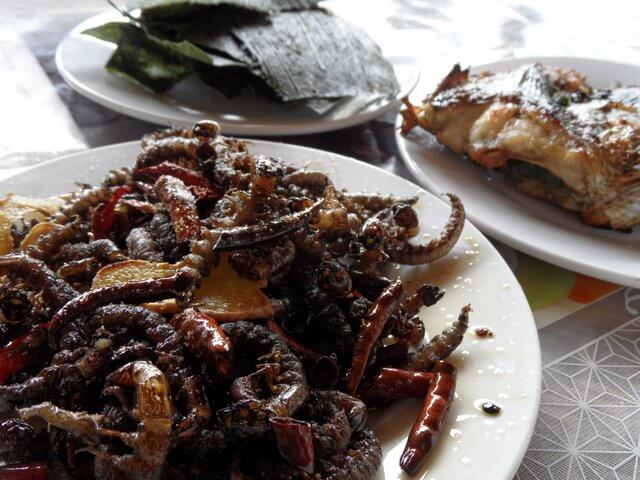
Insects for lunch again
Bypassing the boring restaurants in the small town of Menglun, we stopped at the house of a friend of the driver. They’d converted their garden shed into a tiny restaurant and served food sourced mostly from the river and its banks, not more than 20m from the kitchen.
Our driver explained Dai culture over a feast of water centipedes, river moss, herbed fish, palm hearts and a less recognisable spicy dish.
The water centipedes had been deep-fried in a spicy oil, leaving them with the texture of a tasteless shrimp or crawfish. The moss was pressed into sheets, rather like a green lasagne. The star of the meal was the amazingly flavourful fish, filled with SE Asian herbs rarely seen in North China. The unrecognisable spicy dish was identified only when I dug out an entire chicken head.
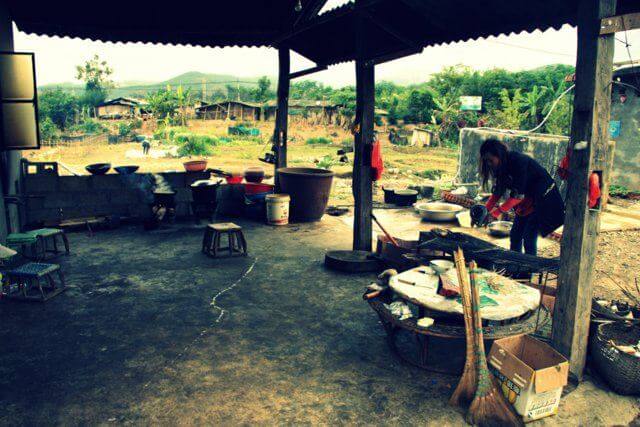
The restaurant kitchen
Dai Culture
People here leave school and get married around 15, have a couple of children, then get divorced around 18. The Dai culture is quite promiscuous and Dai people often get married 4-5 times in their lifetimes.
During the Dai New Year (in April) is the most important occasion on the Dai calendar, a Water Splashing Festival. Community and tourists alike take to the streets for a huge water fight.
The Water Splashing Festival is also open season for couples to sleep with other people. It’s quite busy around here at those times, so food and rooms are at a 500% premium.
Visiting Xishuangbanna
Xishuangbanna took the #4 spot in Travel+Leisure’s top destinations of 2012.
It’s a great place to drop in to after the cold of Lijiang in winter, or if you’re an avid bird watcher. It reminds me most closely of Thailand or Laos, both in landscape and the inhabitant’s relaxed attitudes, and certainly doesn’t feel much like China at all.
The main draw is China’s only tropical rainforest, protected in the 2,200 acre Xishuangbanna Tropical Botanical Gardens. There are also elephants, monkeys, tigers and leopards, although they’re rarely seen. Mostly it’s a place to simply relax and recuperate.






Those insects look scary but I wouldn’t be surprised if didn’t taste bad. Cities like these take pride in their culture and tradition and I’m sure the locals are proud of their insects for lunch. Just saying.
You are right, they thought these insects are much better and presure than other meat (pig or oxes). It’s realy dilicious, at least, much better than the scorpion.
True – I tried scorpion in Beijing (at Donghuamen). It really didn’t have much flavour.
Pingback: Weird foods I’ve sampled whilst travelling around the world